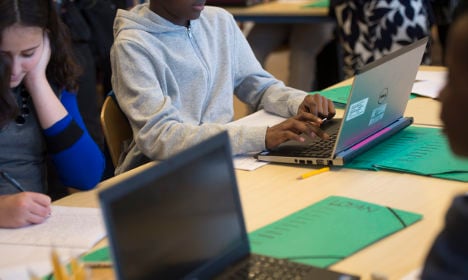p { margin-bottom: 0.25cm; line-height: 120%; }a:link { }
The Organization for Economic Co-operation and Development (OECD) released a review of Sweden's school system on Monday morning.
The report, titled 'Improving Schools in Sweden: An OECD Perspective', provided a series of recommendations to reverse a decade-long decline in the country's performance in the OECD's Programme of International Student Assessment (Pisa) survey, with a focus on teacher training and higher entry requirements for future school staff.
The study comes follows the latest international Pisa survey, in December 2013, which showed that Swedish pupils' knowledge in the subjects of mathematics, natural sciences, and reading comprehension had dropped the most out of all the 33 OECD countries – after having been one of the top performers at the start of the new millennium. The then centre-right coalition asked the OECD for help to assess what had gone wrong.
OECD Director for Education and Skills Andreas Schleicher, Professor Graham Donaldson of Glasgow University, and OECD analyst Marco Kools presented the findings to Sweden's Education Minister Gustav Fridolin of the Green Party, Minister for Upper Secondary Schools Aida Hadzialic of the Social Democrats, and the Director-General of the Swedish National Agency for Education (Skolverket) Anna Ekström at a press conference in Stockholm on Monday.
Schleicher said that Sweden needed to invest in its teaching staff, through higher wages and career opportunities. He also said that Swedish teachers should demand more from their pupils.
"In general, the Swedish students' own expectations were relatively low in comparison with other countries," he told the conference.
He highlighted large divides between schools in different regions. Swedish schools are largely run at council level. The current government has previously mentioned greater state involvement as one of the areas it wants to invest in.
"The teaching profession is no longer attractive in Sweden," he told reporters.
"Only five percent of teachers think what they do everyday is respected by society."
The report also warned of growing inequality with almost half (48 percent) of immigrant children failing to make the grade in mathematics and called for changes to the free school-choice system to counteract the risk of segregation.
Anna Ekström, head of Sweden's education agency, said "no one was surprised" by the critical report which was requested by the outgoing centre-right government last year.
"Our education system has problems," she said, adding: "we have a clear view of the challenges the Swedish school system is facing."
Sweden's left-green government has launched an inquiry into new education reforms due to report next year and had pledged a major increase in teaching salaries from 2016.



 Please whitelist us to continue reading.
Please whitelist us to continue reading.
Member comments